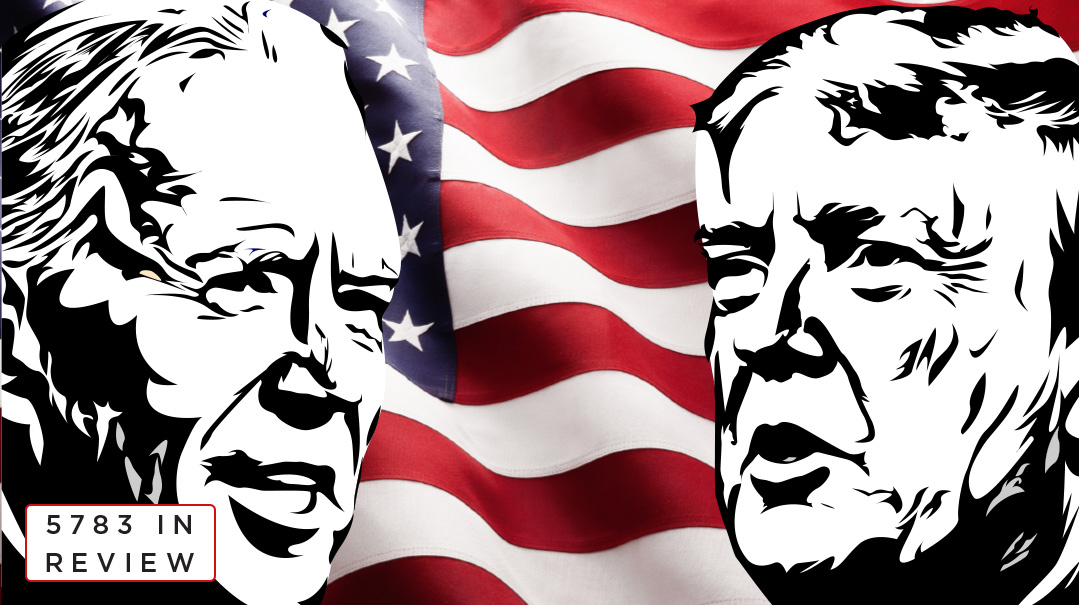Rose Report: 5783

It’s hard to remember a year in which the US and Israeli governments engaged in more public squabbles

Bruised, Battered, but Not Broken
F
or the Biden administration, the interim Israeli government it was dealing with a year ago was a dream come true.
Yair Lapid was acting prime minister. He presided over a liberal-left coalition that included an Israeli-Arab party. This docile government had just agreed to a US-mediated proposal asking Israel to cede international waters with potentially vast oil and gas reserves to the Hezbollah-controlled Lebanese regime. Lapid, and his predecessor Naftali Bennett, offered only passive resistance to America’s dogged efforts to renew a nuclear deal with Iran that previous Israeli governments viewed as an existential threat.
The American dream fell out of bed with a thud in November, after Israel’s fifth election in four years returned Binyamin Netanyahu to power, and he formed a center-right coalition with 32 Orthodox Jews of various stripes. Even before the new coalition was sworn in, American ambassador Tom Nides was interfering in Israel’s internal affairs, warning Netanyahu that the Biden administration would not cooperate with coalition partners it deemed to be “extreme right.”
The ink was barely dry on the coalition agreements when Biden offered his anemic congratulations, warning Netanyahu that his administration would “oppose policies that endanger” the two-state solution or “contradict our mutual interests and values.”
Of course, it was the Biden administration that would unilaterally determine what those mutual interests and values should be, and how to define the contradictions.
The administration turned downright surly. It’s hard to remember a year in which the US and Israeli governments engaged in more public squabbles or when a US administration deliberately snubbed Israel’s prime minister. These ill-considered stances have emboldened Israel’s enemies, raising threats of war, and have caused immense damage to America’s regional standing. Biden’s shabby treatment of Israel leads other nations to question America’s reliability as an ally.
The final straw occurred when the coalition introduced its package of judicial reforms. A slew of administration officials cranked out a daily barrage of criticism, demanding that Israel “pump the brakes” on the plan and cheering on the disinformation campaign and scare tactics of domestic critics who falsely claimed that judicial reform was a Trojan horse to convert Israel into a religious autocracy.
Had the Biden administration shown the same urgency and interest in support of Iranians demonstrating on behalf of regime change in the Islamic Republic, then perhaps one could have made the case that its concern for promoting global democracy was consistent and genuine. But they didn’t.
That’s the recap of the doom and gloom. There are still plenty of rays of sunshine.
The mutual defense and intelligence-sharing relationship remains strong. More than 250 major US multinationals either have plants, offices, or R&D relationships in Israel. Trade between the two countries has reached $50 billion a year.
While the $3.8 billion in annual US military assistance to Israel has become a campaign issue, the sum amounts to about 5/1000 of 1% of America’s annual $6 trillion budget. It’s a drop in the bucket for the US to retain some influence over Israel.
At press time, Biden was on the verge of ending his Netanyahu boycott, with the two trying to find time to meet when Netanyahu attends the UN General Assembly in New York. When they finally meet, Biden should remember that shared values don’t mean identical values. The aid and support the US has provided to Israel is also in America’s interest and doesn’t give the US carte blanche to publicly berate Israel.
Other nations are watching. Saudi Arabia and a handful of Muslim nations are considering normalizing ties with Israel. As this process unfolds, it has great potential to contribute to global peace and security and isolate Islamic radicals.
But the Saudis, and others, whose systems of government are far more rigid and whose track record on human rights is suspect, will expect assurances that they will be free to operate domestically as they see fit, and not worry that America will castigate them, or fray an alliance over internal matters that are none of America’s business.
Who’s Up
Recep Tayyip Erdogan
Turkish voters should have sent President Erdogan packing in his country’s May elections. Inflation had spiked to 40%. Double-digit interest rates were just days away, and the Turkish lira had shed half its value over the previous two years.
Erdogan had to endure two rounds of voting, but he ultimately emerged victorious with a slim 52% of the vote and is now embarking on his third decade in power. Perhaps humbled by his tiny margin of victory, and in need of more regional allies, Erdogan began his new term by thawing Turkey’s frosty relations with Israel.
Who’s Down
Senator Mitch McConnell (R-KY)
Mitch McConnell must be doing something right. He’s now in his seventh term as a senator from Kentucky, but outside the Bluegrass State, his ratings are stuck in the mud. National polls show McConnell’s favorability rating is a mere 20%, while 67% view him unfavorably. Democrats don’t like him because he is a Republican. Many Republicans loathe him because he broke ranks with Donald Trump, and as Senate minority leader, he’s been willing to compromise with Democrats to get things done. History will probably judge McConnell more favorably, but considering that health issues have just cropped up, this could be the 81-year-old’s last term in office.
Jefferson Was No Prophet, but…
“The opinion which gives judges the right to decide what laws are constitutional and what not — not only for themselves in their sphere of action — but for the legislature and executive also in their spheres, would make the judiciary a despotic branch.”
In the slightly stilted language of his day, President Thomas Jefferson conveyed this prescient opinion in a September 1804 letter to former first lady and presidential advisor Abigail Adams that granting judges unlimited power to overrule elected officials was a recipe for disaster.
Population Explosion
According to United Nations estimates, the world’s population topped the 8 billion mark in November 2022, while India surpassed China as the world’s most populous nation. Technology continued to boom. The Radicati Group, a technology research firm, estimates that businesses and consumers sent more than 333 billion emails in 2022. They forecast that number will grow to 392 billion by the end of 2026.
(Originally featured in Mishpacha, Issue 978)
Oops! We could not locate your form.







